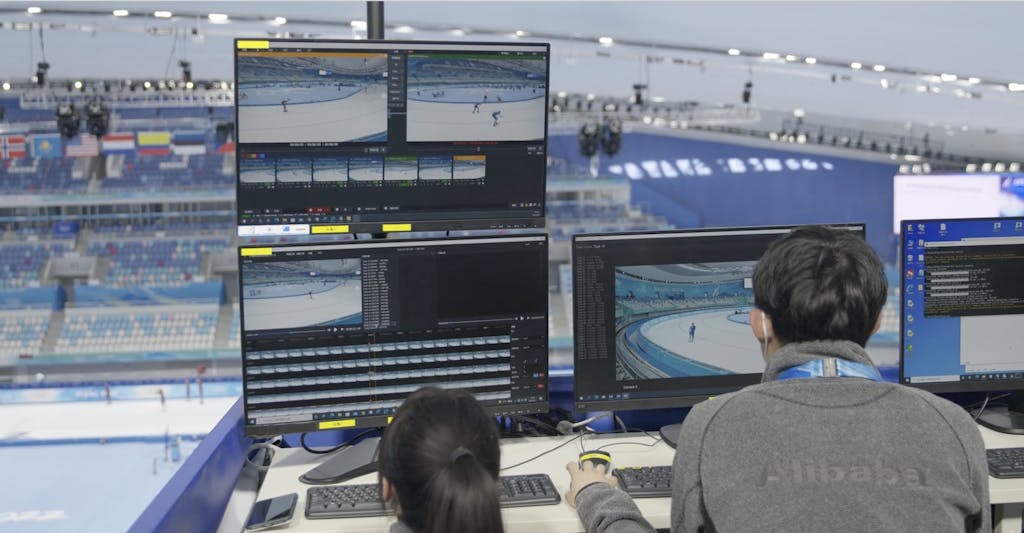At an event where pandemic-related attendance restrictions made digital engagement more important than ever, the impact of virtual influencer Dong Dong was particularly striking during the Beijing 2022 Winter Olympic Games.
The cloud technology-powered digital persona, created by Alibaba Group, the International Olympic Committee Worldwide TOP Partner, attracted more than two million live-streaming viewers between February 4 and 20. Over those dates, bookmarking the opening and closing ceremonies of the Games, Dong Dong amassed a fan base of more than 100,000.
With human-like features, actions and emotions, the virtual Beijing-born 22-year-old winter sports enthusiast provided Olympic facts, danced to the Games’ official theme song and interacted with the audience in live streams through a state-of-the-art language-generating model and text-to-speech framework.
Natural interactions
According to Xiaolong Li, leader of Alibaba Virtual Human and Intelligent Customer Service, Dong Dong was designed to “create better engagement with the younger, digital natives in an exciting and natural way” and “deliver Olympic Winter Games experiences relating to cloud and e-commerce platform services to fans in a creative way”.
Developed by Alibaba DAMO Academy, Alibaba’s global research initiative, Dong Dong – whose name means ‘winter’ in Mandarin – also promoted merchandise via the official Olympic shop in China on Alibaba’s e-commerce platform.
Meanwhile, Alibaba’s official Olympic store on Tmall – which went live 100 days before the start of the Games – displayed Beijing 2022 products in more than 7,000 stores across China via Alibaba’s cloud-shelf technology. From kiosks in the outlets, consumers could create their own personalised Olympic-themed merchandise, such as t-shirts and bags, tailored to their preferences.
Real-time communication
Dong Dong represented just one of Alibaba’s cloud-based innovations at Beijing 2022.
Alibaba’s ‘Cloud ME’ technology, powered by the company’s real-time communication solution, facilitated social interactions by allowing fans to meet and have authentic conversations with each other via true-to-life projections.
By stepping into a Cloud ME pop-up booth, participants were able to have their full-body image projected to meet and greet others virtually. Video and audio produced in the Cloud ME booth were transmitted on Alibaba Cloud, with the RTC solution powered by Alibaba’s advanced cloud computing capabilities and global network coverage.
Backed by Alibaba Cloud’s low latency, live recordings were projected onto a remote 4K high-definition screen within 200 milliseconds, generating realistic holograms with micro facial expressions and clothing texture.
Showcasing
The use cases for such RTC technologies extend well beyond major sporting events.
“The RTC solution powered by cloud technology plays a critical role in helping the world to connect effectively,” said Lijuan Chen, general manager of product and solution at Alibaba Cloud Intelligence. “Leveraging our global cloud network and self-proprietary algorithms, we aim to bring the benefits of RTC to various day-to-day scenarios including online education, interactive entertainment, video conferencing and other enterprise services.”
“Alibaba is committed to the digitalisation of the Olympic Games and providing the technology infrastructure to promote a more inclusive and engaging experience,” said Daniel Zhang, chairman and chief executive of Alibaba Group.
Cloud-based initiatives
Alibaba Cloud underpinned various initiatives in relation to Beijing 2022. Core Games technology services were migrated to Alibaba Cloud infrastructure, helping to increase efficiency, reduce the cost of IT infrastructure, hardware and associated management, and enabling real-time intelligence and analysis.
In collaboration with Olympic Broadcasting Services, Alibaba Cloud technologies were used to increase broadcasting efficiency whilst bolstering coverage of the event through more innovative and inclusive viewing experiences. More than 20 broadcast rights-holders used live cloud infrastructure to receive the multilateral live signals of the Games in HD or UHD via the OBS Cloud.
This helped provide a fresh viewing perspective on the lightning-quick action on the ice and snow. With state-of-the-art frame-freezes and multi-camera replays, the technology also supported the Olympic Channel Services multimedia platform, which produced 6,000 hours of footage during the Games and aired coverage to more than 220 countries and territories.
As highlighted by Selina Yuan, general manager of International Business at Alibaba Cloud Intelligence, transmitting live content via cloud technology was particularly useful for media partners who were “unable to attend the Games in person or afford the up-front cost of on-premise infrastructure”.

Technology for the future
Alibaba’s technological support for the Olympic movement will continue to develop and evolve, with the company’s partnership with the IOC due to run until the 2028 Summer Games in Los Angeles.
With this in mind, the digital initiatives at Beijing 2022 have provided significant foundations for the future.
According to Chris Tung, Alibaba Group’s chief marketing officer, the company’s digital initiatives were designed to bring to sports fans “a unique experience – as interactive, engaging and personalised as possible”.
He added: “As we continue to innovate and create new formats of engagement, we hope to apply these technologies to other global sports games or events in the future, so consumers across the globe can benefit from these cloud-based innovations.”